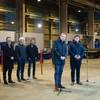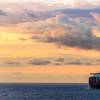Trawlercat Marine Announces Interest in JV
Trawlercat Marine Designs (TMD) a power catamaran design company in New Westminster, BC Canada has announced that they are interested in exploring a Joint Venture Partnership with an established East Coast USA Fiberglass Boat Builder and a Financial Investor(s) to jointly build their MKlll Hull Carbon-Cat catamaran work-boats.
TMD has been approached by US and UK Maritime Security Companies with an urgent need to provide up to nine of their purpose designed armed and armored Anti-Piracy Personal Escort Vessels (PEVs). Since November 2011 TMD claims to have lost sales of their PEVs with a Gross Profit value of over US$25million due to their inability to build and deliver these vessels in a timely manner.
The PEVs will escort ships through the notorious pirate infested waters of the Gulf of Aden. One PEV can escort up to 3 ships and 5 PEVs can escort up to 20 ships in a convoy formation developed by TMD. Other PEVs are intended as Patrol Boats to patrol large offshore anchorages in the West African Gulf of Guinea, the Persian Gulf and the Gulf of Oman where ships sitting at anchor can wait up to 8 weeks for a berth making them sitting targets and very vulnerable to pirate attacks.
TMD states that ideally they would like to find an east coast Boat Builder with an ocean access fiberglass boat building facility around 90,000 square feet who is tired of waiting for the return of the US Recreational Boat Market and would be willing to turn their business around to build TMD’s carbon fiber catamarans for the year round Global Work-Boat Catamaran Market.
TMD also has a need to build carbon fiber catamarans for the huge UK and European Offshore Wind Farm (OWF) industry and to be in the forefront of the North and South American and Asian OWF industries as they emerge. The UK and European OWF industries are already a rapidly expanding multi-billion dollar industry and OWF-Crew Transfer Vessels (CTV) are required during the wind farm construction period to take work crews out to the wind farm site and from tower to tower 24/7. CTVs are also required for year round regular operations and maintenance (O&M) during the 20 year life time of the wind farm.
TMD has been following the OWF Industry since 2004 and claims to have plans to set up and franchise Crew Transfer Vessel Operations as they see this as providing long term revenue streams that will be far more profitable than building and selling the boat.
TMD estimates they will need to build up to 40 of their 20m to 35m work-boat Carbon Cats a year and the only way to achieve this they say is by investing in two sets of hull molds. The catamarans come in six sizes that come out of just two expandable hull platform molds and must be built using the epoxy resin infused carbon fiber and Kevlar foam sandwich construction method giving them exceptional strength and light weight.
TMD’s Carbon Cats are twice as strong and half the weight of the aluminum cats that presently monopolize the OWF industry. The light weight allows TMD to use smaller engines that weigh less, cost less, burn less fuel and still outperform the heavier aluminum cats. TMD estimates their better performance will save OWF-CTV Operators hundreds of thousands of dollars a year in fuel and maintenance costs per vessel and believe the ongoing profits will have these Operators switching to Carbon Cats as soon as they are available.
TMD believes they can see the day when aluminum work-boats, just like wooden work-boats will go the way of the dinosaur and be replaced by the new technology of Carbon Cats. To substantiate this claim they point to the latest carbon fiber passenger aircraft now being built by Boeing and Airbus.
With the 20m and 29m expandable hull platform production molds Carbon Cats can be produced as PEVs and OWF vessels and many other workboat catamarans. The relatively flat superstructures have many














